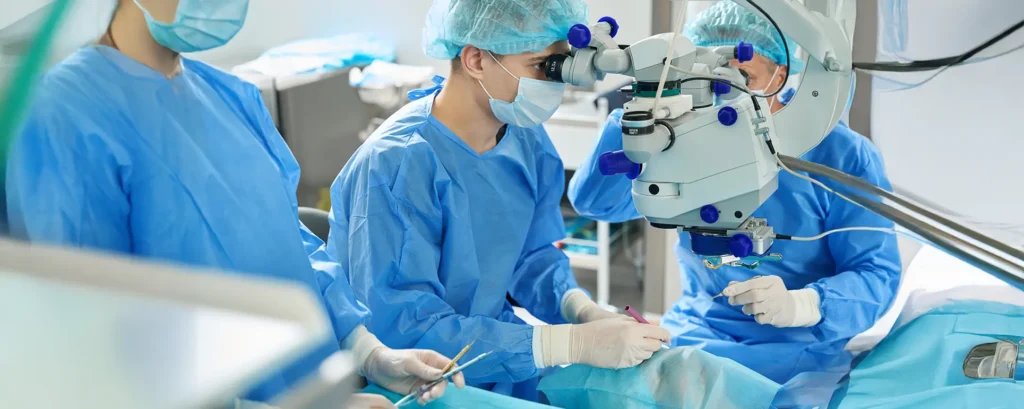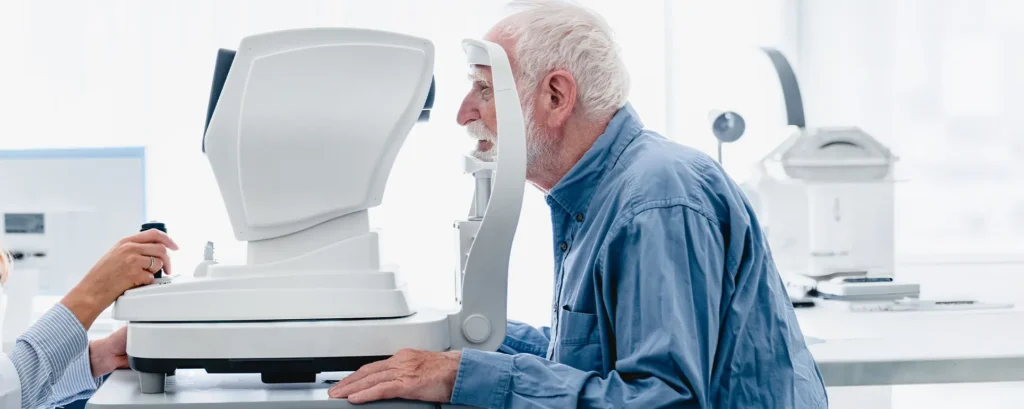If you’ve been told you have both cataracts and age-related macular degeneration (AMD), you might feel uncertain about what to do next. Cataracts cloud the lens of your eye, while AMD damages the retina’s central vision area—the macula. Together, these two conditions can make everyday activities like reading or recognising faces extremely difficult. But you’re probably wondering: will cataract surgery help if your macula is already compromised?
The answer isn’t black and white. Cataract surgery might still improve your overall vision, particularly in terms of brightness and clarity. However, the benefits depend largely on the type and severity of AMD, as well as the stage of your cataracts. This article walks you through how cataract surgeons approach this situation, what kinds of visual improvements you can expect, and how to decide whether surgery is right for you.
Understanding the Two Conditions Separately
Let’s start by separating the two conditions. Cataracts are a clouding of the natural lens in your eye. This causes blurry vision, sensitivity to light, and faded colours. Cataract surgery replaces that cloudy lens with a clear artificial one, usually improving vision significantly.
Macular degeneration, on the other hand, is a condition affecting the central part of your retina—the macula. This is the part responsible for sharp, detailed vision. In AMD, the macula gradually becomes damaged, especially in the “dry” form of the disease. In the “wet” form, abnormal blood vessels can grow under the retina and leak fluid or blood, causing rapid vision loss.
Having both conditions together complicates things. Even if you remove the cloudy lens, damage to the macula can still limit how well you see. But for many people, addressing the cataract can still offer enough improvement to make daily life easier.
Does Cataract Surgery Help When You Have AMD?
Here’s the honest truth: cataract surgery can’t fix macular degeneration. But it may still enhance your vision by removing the blur caused by the cataract, allowing your remaining healthy retina to function more efficiently.
Many patients with early or intermediate AMD notice that their vision improves in terms of contrast, light sensitivity, and peripheral vision after cataract surgery. Even if you still have difficulty with fine detail, removing the cataract helps your retina receive clearer images overall.
However, those with advanced dry AMD or active wet AMD may notice only modest improvements—or none at all. In these cases, surgery is still possible, but the outcomes are often less dramatic. That’s why managing expectations is just as important as managing the surgery itself.
How Surgeons Assess Whether Surgery Is Worthwhile

Ophthalmologists don’t take this decision lightly. They’ll look closely at how much of your vision loss is due to cataracts versus AMD. A detailed retinal scan using OCT (Optical Coherence Tomography) helps determine how much damage exists in your macula.
They’ll also assess whether your AMD is stable. If you have wet AMD, you may need to be treated with injections (anti-VEGF therapy) before even considering surgery. And if your central vision is already significantly impaired, your surgeon may advise against surgery altogether—unless the cataract is so dense it’s affecting peripheral vision or quality of life.
Surgeons will also consider your lifestyle. If you rely on peripheral vision for mobility, removing the cataract might still help you move around more safely and confidently, even if it doesn’t restore reading vision.
Choosing the Right Intraocular Lens (IOL)
During cataract surgery, your natural lens is replaced with an artificial intraocular lens. For patients without AMD, there are multiple types of IOLs—monofocal, multifocal, toric, and extended depth of focus lenses. But for those with AMD, the choice is more limited.
Surgeons generally recommend monofocal lenses set for distance vision. This avoids the contrast-reduction issues seen with multifocal or premium lenses, which split light into different focal points. Since macular degeneration already reduces contrast sensitivity, it’s best not to worsen it with a complex IOL design.
In some cases, a specialised telescopic lens implant may be considered for patients with end-stage AMD. These are rare and usually reserved for very specific cases, but they may help magnify central vision if most of your peripheral retina is healthy.
The Risks Are Slightly Higher—But Still Low Overall

Cataract surgery is one of the safest operations in modern medicine. That said, having AMD—especially the wet type—adds a few more variables. The risk of post-op complications like cystoid macular oedema (fluid buildup in the retina) is slightly higher in AMD patients.
Additionally, some surgeons believe there’s a theoretical risk that cataract surgery could accelerate AMD progression, especially if the retina is exposed to more blue light after lens replacement. However, this remains a debated topic in ophthalmology, and modern IOLs often come with built-in UV and blue light filters to mitigate this.
In most cases, the benefits of clearer vision outweigh these small risks—but your surgeon will go over them in detail during your consultation.
Setting Realistic Expectations Is Key
One of the most important parts of the process is understanding what cataract surgery can and can’t do when you have AMD. If you’ve been struggling with blurry vision, glare, or poor night vision due to cataracts, surgery may offer notable relief. But it won’t restore damaged retinal cells or reverse AMD progression.
You might see better colours, sharper outlines, and less glare—but you may still need magnifiers or special lighting for reading or detailed tasks. In other words, surgery can optimise what’s left of your vision, but it won’t bring back what AMD has already taken.
Surgeons will walk you through these nuances well before surgery day, so you can make a truly informed decision.
Coordination with Your Retina Specialist
If you’re under the care of a retina specialist for AMD, your cataract surgeon will likely coordinate with them. Timing matters—especially for patients with wet AMD who receive injections. Ideally, surgery is scheduled when the macula is stable, and your retina doctor agrees it’s safe to proceed.
This collaboration ensures that both parts of your eye care team are aligned, improving outcomes and reducing risk.
Recovery and Aftercare Considerations

The recovery process is broadly the same whether or not you have AMD—most people see their best results about 4–6 weeks after surgery. However, if you have macular degeneration, you may need a longer period of visual rehabilitation to get used to the new clarity while still working around central vision loss.
You may also require more frequent follow-up visits to monitor for macular swelling or new bleeding in the case of wet AMD. Visual aids like electronic magnifiers, large-print materials, and contrast-enhancing glasses may be introduced post-op to help you get the most out of your improved lens clarity.
When Cataract Surgery May Not Be Worth It
In some cases, surgeons may advise holding off on cataract surgery altogether—especially if you have:
- End-stage geographic atrophy with no usable central vision
- Very early cataracts that aren’t yet visually significant
- Unstable wet AMD with active bleeding or fluid
In these situations, the risks or disappointments may outweigh the benefits. But for most people, even modest gains in contrast or brightness can still improve day-to-day life—so the decision should always be personalised.
FAQs: Cataract Surgery and Macular Degeneration
- Can cataract surgery make macular degeneration worse?
There is currently no conclusive evidence that cataract surgery directly causes macular degeneration to worsen, especially when performed with proper preoperative planning and follow-up. Some earlier theories suggested that removing the natural lens might allow more light—particularly blue light—to reach the retina, possibly accelerating AMD progression. However, most modern intraocular lenses come with UV and blue-light filtering built in. For patients with stable AMD, the benefits of clearer vision and improved quality of life usually far outweigh any minimal theoretical risks. Nonetheless, every case is different, so this risk should always be discussed with your ophthalmologist. - Will cataract surgery help if I already have poor central vision from AMD?
Even if you have significant central vision loss due to AMD, cataract surgery can still provide noticeable improvements in certain aspects of vision. While it won’t restore damaged macular cells or reverse existing retinal degeneration, removing the cloudy lens can enhance contrast sensitivity, reduce glare, and improve peripheral vision. Many patients report better colour perception and brightness, even when central sharpness remains limited. These seemingly small gains can make meaningful differences in everyday tasks like navigating around the home or recognising large objects, making the surgery potentially worthwhile despite the limitations. - Is it safe to have cataract surgery while receiving injections for wet AMD?
Yes, cataract surgery can be performed safely while a patient is undergoing anti-VEGF injections for wet AMD, but careful timing and coordination are essential. Most ophthalmologists prefer to wait until the wet AMD is stable or responding well to treatment before going ahead with surgery. Sometimes, an injection is administered shortly before or after the procedure to keep the condition under control. The key is to work closely with your retina specialist, who can help ensure that your macula is in the best possible state before surgery, reducing the risk of postoperative flare-ups or complications. - What kind of lens should I get if I have AMD?
In most cases, people with AMD are advised to receive a monofocal intraocular lens (IOL), which provides clear vision at one set distance—typically for distance. This is because premium lenses like multifocal or extended depth-of-focus IOLs can reduce contrast sensitivity, which is already compromised in patients with AMD. By keeping the lens design simple and avoiding light-splitting technology, monofocal lenses maximise the clarity and contrast available to the retina. Your surgeon will assess your individual case, including any astigmatism, and choose a lens that complements your existing visual capacity. - Will I still need glasses after surgery?
It’s quite likely that you’ll still need glasses after cataract surgery, especially for reading or intermediate vision. Because multifocal or accommodating lenses are usually avoided in AMD patients, the standard monofocal lens is often set for distance vision. This means that for close-up tasks—like reading, writing, or using a phone—you’ll require prescription glasses. Some patients opt for monovision (one eye for distance, one for near), but this is not always recommended in the presence of AMD. Post-operative vision aids like magnifiers or enhanced lighting may also be useful depending on how your macular degeneration affects your central vision. - Can I have surgery on both eyes if I have AMD?
Yes, patients with AMD can undergo cataract surgery in both eyes, but the procedures are usually spaced apart unless you are having Immediate Sequential Bilateral Cataract Surgery (ISBCS), which is less common in AMD cases. Most surgeons prefer to operate on one eye first, monitor the visual results and healing, and then plan the second surgery based on how your retina responds. This staggered approach is particularly helpful in AMD patients to ensure there are no surprises with retinal swelling, bleeding, or other complications before proceeding to the other eye. - How long will it take to see improvement after surgery?
Vision generally begins to improve within a few days after cataract surgery, but for patients with macular degeneration, the full benefit might take several weeks to assess. It typically takes 4 to 6 weeks for your vision to stabilise, and additional visual rehabilitation or low-vision aids may be needed. Because AMD limits central vision, the way you perceive the improvements might be different from others who do not have retinal disease. It’s also possible that your retina specialist will want to monitor you more closely during this period to check for any signs of inflammation or fluid buildup. - What if I have dry AMD and it’s getting worse?
If you have dry AMD that is slowly progressing, cataract surgery may still be a viable and beneficial option. Even in the presence of macular thinning or small drusen, removing a dense cataract can help make the most of your remaining retinal function. However, if your dry AMD has advanced into geographic atrophy and you have lost significant central vision, the benefits may be more modest. Your surgeon will carefully evaluate your retinal scans to determine how much useful vision is likely to be recovered and whether the procedure is likely to impact your quality of life in a meaningful way. - Can special implants help with macular degeneration?
Some patients with advanced AMD may be eligible for implantable miniature telescopes, which are designed to magnify central images and project them onto healthier parts of the retina. These specialised implants are typically reserved for those with end-stage AMD and significant bilateral central vision loss. While they can offer functional improvement for some individuals, the eligibility criteria are strict, and the devices require an adjustment period with extensive visual training. Most AMD patients undergoing cataract surgery will still benefit most from a standard monofocal IOL, as it preserves the best contrast and clarity possible. - Should I avoid surgery altogether if I have AMD?
Not necessarily. Many patients with AMD still benefit from cataract surgery—especially if their cataracts are contributing significantly to their visual difficulties. The key is to have a thorough preoperative assessment and a realistic understanding of what surgery can achieve. Even if the improvement is mostly in contrast, brightness, or glare reduction, these can still translate into better safety and independence in daily life. Unless your AMD is extremely advanced and cataract removal is unlikely to make any difference, surgery is often still worth considering after careful consultation with your eye care team.
Final Thoughts
Cataract surgery when you have macular degeneration isn’t always straightforward—but that doesn’t mean it’s not worthwhile. With the right planning, realistic expectations, and input from both your cataract surgeon and retina specialist, you can often achieve meaningful improvements in your vision.
At London Cataract Centre, we regularly see patients with AMD and other complex eye conditions. Our team takes the time to assess your individual case, explain your options clearly, and coordinate with your existing eye care providers to ensure a safe and tailored experience. If you’ve been told you have both cataracts and macular degeneration, you’re not alone—and we’re here to help you see your best.
References
- Tang, R., et al., 2023. Cataract surgery in people with neovascular AMD: visual acuity outcomes and anti‑VEGF treatment requirements. BMC Ophthalmology, 23, 279. Available at: https://bmcophthalmol.biomedcentral.com/articles/10.1186/s12886-023-03028-7
- Tan, C.S., Ngo, W.K., Lim, L.W., 2016. Visual outcomes in patients with neovascular age-related macular degeneration after cataract surgery. Acta Ophthalmologica Scandinavica, 94(3), e254. Available at: https://pubmed.ncbi.nlm.nih.gov/27255691/
- Jeppesen, B.T., et al., 2015. Cataract surgery and age-related macular degeneration: an evidence-based update. Acta Ophthalmologica, 93(5), 593–600. Available at: https://www.researchgate.net/publication/271533633_Cataract_surgery_and_age-related_macular_degeneration_An_evidence-based_update
- Malick, H., Din, N., Rajput, R. & Mushtaq, B., 2021. Cataract surgery in patients with neovascular age‑related macular degeneration—examination of current practice among UK ophthalmic surgeons. Eye, 35, 685–686. Available at: https://doi.org/10.1038/s41433-020-0863-7

